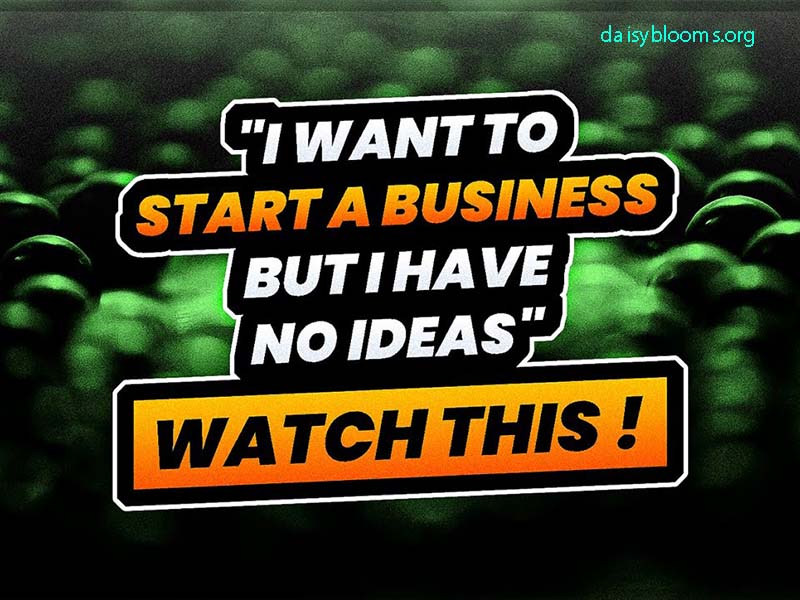Starting a business can be one of the most rewarding decisions in life. The idea of being your own boss, achieving financial independence, and making an impact in the world excites many aspiring entrepreneurs. However, a common challenge that many face is the lack of a clear business idea. If you’re saying, “I want to start a business, but have no ideas,” you’re not alone. This guide will help you discover the best ways to come up with a business idea that aligns with your skills, passions, and market demand.
Understanding Why You Want to Start a Business
Before diving into the process of finding a business idea, it’s crucial to understand your motivations. Ask yourself: Why do I want to start a business? Whether it’s for financial freedom, following your passion, or leaving a legacy, knowing your “why” will guide you in determining the right business idea.
For instance
Financial Independence
If your goal is financial independence, focus on profitable industries with high demand.
Flexibility and Freedom
Some businesses offer the flexibility of working from home or controlling your schedule.
Impact and Purpose
If making an impact is important to you, look for business ideas that address social, environmental, or community challenges.
Assess Your Strengths and Skills
One of the most effective ways to discover a business idea is to assess your skills and strengths. You may not realize it, but the expertise you’ve accumulated over time could be turned into a profitable venture. Whether you’re good at managing projects, marketing, or crafting, your strengths could point you toward a viable business.
To help identify your strengths
List Your Skills
Make a list of your personal and professional skills.
Identify Marketable Talents
Identify skills that are in high demand or could provide solutions to others.
Look for Gaps in the Market
Research areas where your skills could fill a gap in the market. For example, if you’re great at graphic design, there’s always demand for creating logos, websites, and branding for small businesses.
Discover Your Passions
While skills are important, aligning your business idea with something you’re passionate about can make the journey much more fulfilling. Passion gives you the energy and motivation to push through the inevitable challenges that come with entrepreneurship.
To discover your passions, ask yourself
What activities make you feel excited and engaged?
Are there any hobbies or topics you frequently discuss?
What problems in the world do you want to solve?
Combining passion with skill is the foundation of many successful businesses. For example, if you’re passionate about fitness and skilled in digital marketing, you could start a health-related blog, a YouTube channel, or an online fitness coaching service.
Research Market Trends
Now that you’ve identified your skills and passions, it’s time to research market trends. A great business idea isn’t just about what you like, but also about what people need. You need to find the sweet spot where your skills and passions align with market demand.
Start by
Exploring Industry Trends
Look at current trends in various industries such as technology, health, sustainability, and online services.
Identifying Growing Markets
Focus on industries that are experiencing growth. For instance, the e-commerce, wellness, and online education markets are expanding rapidly.
Understanding Consumer Behavior
Research consumer behavior patterns. What problems are people looking to solve? How are they spending their money?
Generate Business Ideas Using Brainstorming Techniques
If you’re still stuck on what kind of business to start, here are several brainstorming techniques to help generate ideas
Mind Mapping
Create a visual map of your thoughts. Start with your central skills or interests and branch out into related business ideas.
SWOT Analysis
Analyze your strengths, weaknesses, opportunities, and threats. This technique can help you evaluate the feasibility of potential business ideas.
Problem-Solving Approach
Think about common problems that people face and come up with ways to solve them. Businesses that solve problems are often successful.
Crowdsourcing
Ask friends, family, or even online communities for suggestions. Sometimes, others can see potential in you that you may not recognize.
Validate Your Business Idea
Once you have a few ideas, it’s important to validate them. Validation ensures there is a real demand for your product or service before you invest time and money into it.
Here’s how you can validate a business idea
Conduct Market Research
Look into your competitors and see if there’s room for another player. Make sure there’s sufficient demand.
Survey Potential Customers
Use social media, online forums, or email lists to survey potential customers. Ask if they would be interested in your product or service and what they would be willing to pay.
Test with a Minimum Viable Product (MVP)
Create a simple version of your product or service and test it with a small group. This can provide valuable feedback before you fully launch.
Explore Low-Cost Business Ideas
If you’re worried about the costs of starting a business, don’t let that stop you. There are plenty of low-cost business ideas that require minimal investment. Some ideas include
Freelancing
Offer services based on your skills, such as writing, graphic design, or web development.
Dropshipping
Sell products online without holding inventory. You can create an online store using platforms like Shopify and source products through suppliers.
Blogging or Content Creation
If you enjoy writing or creating videos, consider starting a blog or YouTube channel. Once you grow your audience, you can monetize through ads, sponsorships, or affiliate marketing.
Virtual Assistance
Help businesses with administrative tasks such as managing emails, scheduling appointments, or handling social media.
Consider a Franchise
If you want to start a business but don’t have an idea, you might consider purchasing a franchise. A franchise allows you to operate under a well-established brand with a proven business model. This can minimize the risks associated with starting from scratch.
Some benefits of buying a franchise include
Established Brand
You don’t need to build a reputation from scratch.
Support and Training
Most franchisors provide support, training, and marketing assistance.
Reduced Risk
Franchises typically have a higher success rate compared to independent startups.
Leverage Online Platforms
The internet offers numerous platforms for aspiring entrepreneurs to start their own businesses. Some platforms enable you to tap into existing markets without needing to create a product from scratch.
Examples of online platforms include
Etsy
Great for selling handmade crafts, vintage items, or printables.
Airbnb
If you have an extra room or property, you can rent it out on Airbnb for short-term stays.
Upwork and Fiverr
These freelancing platforms allow you to sell your services to clients worldwide.
Amazon FBA (Fulfillment by Amazon)
You can sell products through Amazon, and they handle storage, shipping, and customer service.
Develop a Business Plan
Once you’ve landed on a business idea, it’s essential to develop a business plan. A business plan helps you stay organized and focused on your goals.
Your business plan should include
Executive Summary:
An overview of your business idea and goals.
Market Analysis
Research on your target audience, competitors, and industry trends.
Business Model
Details on how your business will make money.
Marketing Strategy
How you plan to attract and retain customers.
Financial Projections
Estimated costs, revenues, and profits for the first few years.
Take Action and Stay Persistent
Finally, the most important step is to take action. Many aspiring entrepreneurs get stuck in the planning phase and never move forward. Once you have a validated business idea, it’s time to execute your plan.
Remember, starting a business requires persistence and resilience. Challenges will arise, but with the right mindset, you can overcome them. Surround yourself with a supportive network of mentors, entrepreneurs, and like-minded individuals to help you stay motivated.
Conclusion
Starting a business without an initial idea may seem daunting, but with a strategic approach, you can uncover a profitable venture that aligns with your skills, passions, and market demand. By assessing your strengths, researching market trends, and validating your ideas, you can confidently move forward on your entrepreneurial journey. Whether you choose to freelance, start an online business, or explore franchising, the key to success is persistence and a willingness to learn along the way. Now is the time to take that first step and turn your entrepreneurial dreams into reality!


